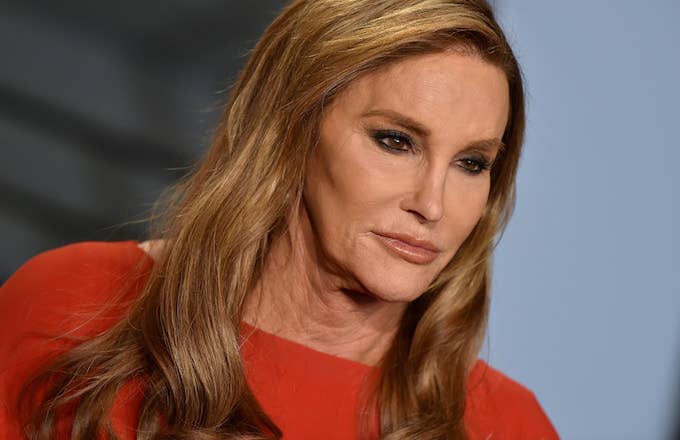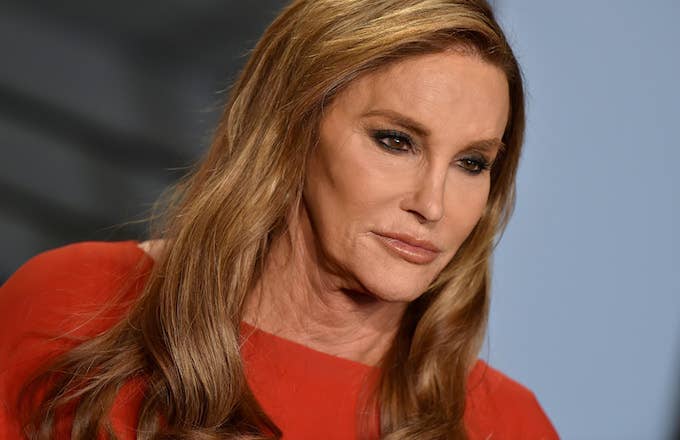
Caitlyn Jenner is trying to reconcile being the first globally famous transgender celebrity who is also a staunch advocate for Donald Trump. Over the course of a weekend in Malibu, Broadly allowed her to open up about her personal life, gender views, and political stances—all of which fused together to provide a far more cohesive picture of the often misunderstood woman.
Jenner, who became Us Magazine’s Woman of the Year and TIME’s Person of the Year runner-up in 2015, is no stranger to fame and the attention it can bring—in her past life, she became an Olympian hero and all-American icon. In this latest chapter, she’s part of the most famous family on Earth and a figurehead for the contemporary transgender movement. Her entire life has been lived under a spotlight that has rarely, if ever, dimmed in favor of her privacy.
While she founded the Caitlyn Jenner Foundation, which offers grants to provide transgender people in Los Angeles with healthcare services, suicide prevention help, and housing, the LGBTQ community is fairly divided on her arguable co-opting of the movement as a celebrity. Voting for Donald Trump and publicly supporting his administration, of course, haven’t helped—even if she did recently criticize his effect on the community.
“It hurts,” she said. “I’m a human, a person. I got the trans community out there bashing on me, I got the Kardashians out there bashing on me. All I do is sit here in the house and try to stay out of trouble.” She then broadly yet arguably poignantly stated, “They don’t know me,” in reference to her identity not only as a celebrity, but as a newly birthed woman.
Regarding the iconography she largely created for herself as an Olympian in the 1970s, Jenner stated firmly that she was well aware of what she was designing. “I created this image knowingly," she said. “I knew what I was doing.” Inevitably, of course, championing an identity that didn’t feel like her own—Bruce, the resilient American hero—became too much to bear. “Not being able to be yourself? That’s tough on your soul,” she said.
Jenner revealed she had breasts when she first met Kris Kardashian, but that the “little B-cup” was easily veiled on a day to day basis—until it wasn’t. “Kris and I got married and I kind of hid it the best that I could,” she explained. “When Kendall was born, I had liposuction and got rid of [my breasts]. Because I thought, I can’t even go swimming with my kid.”
While the Sherwood Country Club is a place for wealthy men to swagger across 18 holes of golf, it was a place of refuge for Jenner during her emotional gender issues. “I would take my little bras up there, in this very quiet golf course, and [see] what it was like playing with boobies,” she said.
As for the criticisms she’s facing from her own community—namely activist Ashlee Marie Preston’s Change.org petition against Jenner winning awards for her bravery—the former Olympian understands the backlash. “I get the criticism that I don’t get it,” she said. “You know why? Because I’m not around it. I understand that. But I’m not going to make excuses for that. I’ve worked hard for that. It’s what America is all about. What they don’t realize is that I didn’t have the anonymity to be able to do this privately. I couldn’t.”
The backlash was only expounded when Jenner was hesitant to support marriage equality during her appearance on the Ellen DeGeneres Show shortly after coming out in 2015. How could a man who became a woman, who was asking for acceptance, not support same-sex marriage?
Jenner seems to have learned from her behavior, while vaguely pointing the finger at how critical the LGBTQ community is instead of accepting that her stance is morally contradictory. “Along the way, did I make mistakes? Absolutely,” she said. “But I never did it maliciously. I just didn’t know, you know? And I really didn’t realize how critical the community was going to be.”
When it comes to her identification as a transgender Republican, Jenner seems ready to make a change within her community, from the inside—as opposed to denouncing the group as a whole, and antagonizing them into moral growth. “The Republicans need the most work when it comes to our issues, I get that,” she said. “I would rather work from the inside. I’m not the type of person who is going to stand on a street corner with a sign and jump up and down. No, I’m going to have dinner with these people.”
Most the time, however, Jenner keeps it close to home with her dog, Bertha, reflecting on life, family, and the light at the inevitable end of the tunnel. “I spend a lot of time by myself here in the house,” she said. “I have a lot of children, but sometimes just because of circumstances, maintaining a close relationship with your kids is very tough. They all have lives. They’ve all moved on.”
“We’re just human beings; we’re going to be here for a very short time,” she continued. “We come and we go and at the end, when it’s all said and done, hopefully your family is going to be there.”
Perhaps most shocking out of all this was Jenner’s admission that she had considered suicide during the turmoil inherent in not being comfortable in your body, only to then not feel comfortable in your own community. “I thought about that a lot over the years,” she said, in reference to her death. “And it would shock everybody. Screw ‘em.”
“I hope when I get up there to the pearly gates, God looks down and says, ‘You did a good damn job, you won the Games, raised wonderful children, and you know, you made a difference in the world. Yeah, come on in,’” she said. “That’s the way I want to go.”

